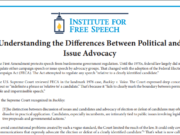- About Us
- About the Institute
- Board, Leadership and Staff
- Contact Us
- Financial Disclosure and Annual Reports
About the Institute

The Institute for Free Speech promotes and defends the First Amendment rights to freely speak, assemble, publish, and petition the government.
Board, Leadership and Staff

Our dedicated professional staff works tirelessly to protect political speech under the freedoms guaranteed by the First Amendment.
Contact Us

Have questions? Get in touch!
Disclosures and Reports

Recent annual reports, audited financial statements, and IRS Form 990s
- Get Involved
- Get Updates
- Contact an Attorney
- Job Opportunities
- Events
Get Updates

Get Updates

Job Opportunities

Events

- Get Legal Help
-


Disclosures and Reports

Recent annual reports, audited financial statements, and IRS Form 990s
Events












